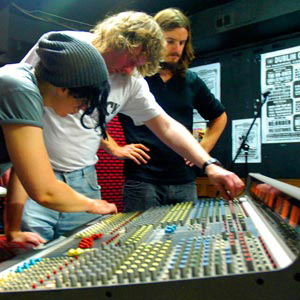Our course will teach you everything you need to know to be able to work as a sound engineer in a music venue, a theatre, a church, a coporate environment, a music festival or on the road with a touring production or band.
The course runs on one day a week for 12 weeks augmented by evenings of work experience which provides a combination of focused lectures and practical sessions coupled with one-to-one training at gigs. You’ll be able to learn at your own pace, in small groups, then experience first-hand what's involved in engineering a show and learn exactly what you need to become a live sound engineer.
The course is carefully designed to give you a solid foundation of theory knowledge augmented by as much hands-on experience of running sound systems in real world scenarios as we can possibly manage - time spent in classrooms staring at blackboards is kept to a minimum in favour of practical experience.
All our tutors are professional sound engineers or specialists in their field who’ve worked at every conceivable type of live venue as well as on the road with a wide range of touring productions. They all possess up to date knowledge of every aspect of live sound engineering as well as the full range of modern equipment we use at live shows big and small - you will be in excellent hands.
The day is split up into sections starting with a group lecture which quickly evolves into demonstrations and practical tasks. The emphasis is very much on getting across the theory you need quickly and easily then allowing you time to explore what you’ve learnt with plenty of hands-on experience.
To read what our graduates say about the course, please visit out testimonials page
Learning Outline

- The responsibilities of a live sound engineer – all the aspects of the job and the various types of work you can do
- Basic electronics - cabling and connections, microphones and DI boxes
- Sound systems - anatomy and evolution
- Equalisation - all types of EQ including fixed, parametric and graphic
- Acoustics - sound propagation and PA systems
- Microphones - techniques, types and how they're used, polar patterns and placement methods
- Outboard - the use of noise gates, compressors, and effects such as reverb and delay
- The Ear - how the ear works, frequency awareness and ear training
- Aux sends - monitor mixes and effects
- Sound system optimisation - ringing out the sound system to minimise unwanted feedback.
- Mixing techniques and practices - analogue and digital
- Wireless technology - mixing in-ear monitors and using wireless microphones
- Backline - how to get the best sound out of drums, guitar, bass, etc
- Maintenance - how to maintain equipment and repair cables
- Stage management - manage your time, stage set up and people skills
- Pre-production - for both house and touring engineers (including festivals)
- Health & Safety - basic requirements and awareness
- Touring etiquette - best practices to ensure a conducive working / travelling environment
- Getting work - networking and job searching techniques
"LST is a great course that I can highly recommend to anyone wanting to learn live sound engineering. I've now got my own PA, host and do my own sound at least 2 nights a week as well as work at local festivals. All thanks to the teachers making the course not only very hands on and knowledgeable, but also running it in a very relaxed environment making the learning process so much easier to take in." - Dave Wheelhouse
Qualification
LST Diploma - A qualification which has been developed by live sound industry professionals to meet the demands and requirements of live sound venues and touring productions. The LST Diploma has been designed to be the equivalent in all respects to a qualification at level 3 on the National Qualifications Framework (NQF), and the Qualifications Credit Framework (QCF).
Course Requirements
We require that all students are aged 18 or over on their chosen start date. We encourage students to have a strong passion for music and an interest in live sound. Previous knowledge and experience is useful but not essential.
Term Dates
For a full list of the upcoming courses and price, please visit the registration page.